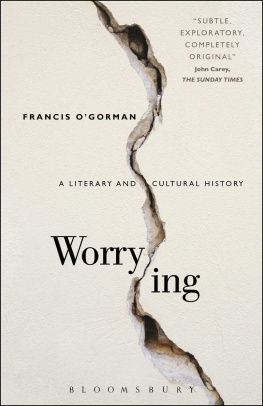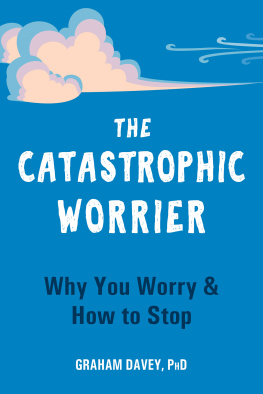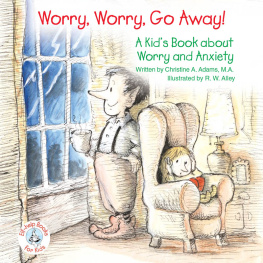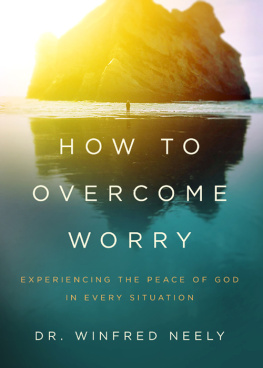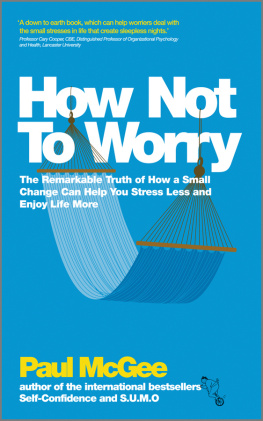Praise for Worrying
[An] affectionate tribute to low-level fretting Mr OGorman is a pleasant and good-humoured guide, and his candid, self-effacing style helps mitigate any boredom. If there is a message, it addresses the ever-expanding cottage industry around happiness and well-being. Mr OGormans celebration of the wonderful eccentricity of human nature is both refreshing and necessary.
The Economist
The best parts of this book, as you would hope from a literary critic, are the textual readings. OGorman doesnt just provide illuminating discussions of worry literature He also reads worry per se as a literary trope, a comedy of mental manners in which its victims are like stage characters trapped in their humours, always enacting the same scenes and parroting the same catchphrases. He is often dryly funny himself While it failed to assuage any of my worries, this winning little book still made me root for and, yes, worry a little for its author. I hope this review stops him fretting for a bit, at least until the next worry arrives.
Joe Moran, The Guardian
Francis OGorman offers a witty, philosophical meditation on the meaning of worry, where it comes from and how it came to be our constant companion Although the visual arts and music can provide temporary distraction for the worrier, we need words fragile, unstable words to express it. Thankfully OGorman has given us some more.
Liz Hoggard, The Independent
An engagingly personal quest to find out what [worry] means, both for good and bad [S]ome of the most striking parts of this book are those in which [OGorman] shares some illuminating intuition about worry that it can be a species of self-indulgence, a way of extending ego into a conversation, or of somehow confirming selfness in the head; or that worriers might, deep down, think too highly of themselves, believe that they are too good to err and certainly too good to admit errors or apologize for them.
Catherine Morris, Times Literary Supplement
It is worth reading for many reasons, but surely because it treats worrying as a complex issue, that is to say, as a feeling which might have a lot of good stuff to be said about it. Worrying works because its not all doom and gloom, it avoids self-pity, and manages to have both an intellectual and personal discussion of an emotional issue from various and surprising angles.
Charlie Pullen, The Bookbag
In his highly anxious but very valuable new book, Francis OGorman seeks to pin down worry as an idea and to record the stories we tell ourselves about it; he sets worrying in both its recent and its deeper cultural history, and he also contemplates the various ways writers and artists have dealt with worry as a category of experience. Worrying also fits into the tradition of breaking down myths and tropes into discrete units, a bit like Mircea Eliades Myth and Reality or C. S. Lewis Studies in Words. We care about these books because we need stories about the cultural past so that we might have a sense of ourselves in time. The real value of OGormans book lies, I think, in the way it flags the politics of the stories we tell ourselves.
Josephine Livingstone, New Republic
It is 4.06 am. Francis OGorman is in bed. His partner and three cats lie fast asleep beside him. But he is awake, worrying. So begins this subtle, exploratory, completely original book.
John Carey, The Sunday Times
[An] intelligent and probing study.
James Williams, The Tablet
In some enjoyably subversive pages, [OGorman] unpicks a few of modernitys best-loved fairy tales.
Dan Hitchens, The Spectator
Worrying is not a self-help book. In fact, it frequently pokes holes in that genre. Nor is the book spiritual in any sense. As the books subtitle suggests, this is a literary and cultural history, as well as a personal one (OGorman is a self-confessed worrier). The book is an exercise in worrying about worry.
Karen Swallow Prior, Christianity Today
Keeping us up with his sleepless stresses did I forget to lock the door downstairs? Francis OGorman comes to think that such anxieties, rather than being just a niggling malfunction, might also represent a constructive aspect of the human condition. Whats the use of worrying?
Rachel Bowlby, Professor of Comparative Literature, Princeton University, USA, and author of A Child of Ones Own: Parental Stories
Worrying
Francis OGorman, from English, Irish, and Hungarian families, was born in 1967 and educated as Organ Scholar of Lady Margaret Hall, Oxford, where he took a double first and a doctorate in English literature. He is the author or editor of 20 books, mostly on English literature, and of more than 70 essays on literature, music, and the condition of the modern English university. His recent work includes The Cambridge Companion to John Ruskin (2015), an edition of Anthony Trollopes The Way We Live Now (Oxford Worlds Classics, 2016), and the Twenty-First Century Oxford Authors edition of the selected poems, prose, and drama of Algernon Charles Swinburne (2016). He is Saintsbury Professor of English Literature at the University of Edinburgh and spends his spare time playing music, traveling in Europe, and sitting in bars.
Worrying
A Literary and Cultural History
Francis OGorman
Bloomsbury Academic
An imprint of Bloomsbury Publishing Inc

What if...?
Contents
Worrying is a book about an ordinary thing; a state of mind that is so familiar we hardly mention it in any detail. But sometimes we do. It was a relief as much as it was, of course, sad to find that there were so many readers of this book, when it was first published, who recognized what I was talking about.
The worries in Worrying, for the most part, are not unique to me. And I hardly discuss worries about anything truly bad. There are serious worries, of course. Grave sickness; the inevitability of bereavement; the threat of redundancy; the threat of staying in a job you can neither bear nor get out of. One reader told me that I had entirely omitted to mention the greatest worry of all: death. That is true, though I am as fretful about that as anyone. My inaugural lecture as a full professor at the University of Leeds was called On the fear of death. It was a peculiarly joyless occasion, as you can imagine.
Worries, as I say in this book, are chiefly the by-product of a fundamental lack of security and a faltering of confidence. Worrying about death is the most extreme manifestation of such insecurity because, of course, we know that we cannot last. But my interest here is, mostly, in other, far less dramatic things: in the commonplace sadness of the everyday, the quotidian bothers, the common or garden moan. I dont make any claims for the intellectual or cultural weightiness of most of the worries I write about. But I care about them because they seem to take up a lot of regular peoples daily time.
Some readers have been generous enough to assume that this book isnt really about me that I am more armor-plated, harder-edged, more academically distanced than I suggest. Those readers are right to point out that, aside from narrating many worries, I hardly say anything about who I am in the pages to come. We dont even know your age, one person told me (Ive now added my year of birth to the biography). But, to borrow the title of Bedich Smetanas first String Quartet, the books From my life all the same.
Next page
